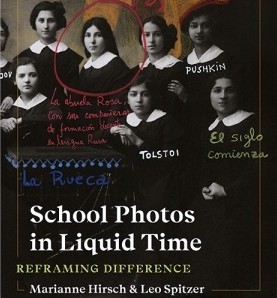Virtual Book Talk: School Photos in Liquid Time: Reframing Difference

To mark its publication, Marianne Hirsch and Leo Spitzer will present their new book, School Photos in Liquid Time. The book explores classroom photographs of schoolchildren and how they are pervasive, even in repressive historical and political contexts, such as that of Nazi-occupied Europe. Hirsch and Spitzer examine this genre of vernacular photography, from clandestine images of Jewish children isolated in Nazi ghettos and Japanese American children incarcerated in camps, to images of Native children removed to North American boarding schools. School Photos in Liquid Time offers a closer look at these images, tracing how photography advances ideologies of social assimilation as well as those of hierarchy and exclusion. In Marianne Hirsch and Leo Spitzer’s deft analysis, school photographs reveal connections between the histories of persecuted subjects in different national and imperial centres.
The event will also feature reflections and responses from Professor Griselda Pollock and Professor Eva Hoffman. There will be an opportunity for questions from the audience.
About the speakers:
Professor Marianne Hirsch is William Peterfield Professor of English and Comparative Literature at Columbia University and Professor in the Institute for Research on Women, Gender and Sexuality. She was born in Romania and educated at Brown University. Her works include The Generation of Postmemory: Writing and Visual Culture After the Holocaust (2012) and Ghosts of Home: The Afterlife of Czernowitz in Jewish Memory (2010), co-authored with Leo Spitzer.
Professor Leo Spitzer is Kathe Tappe Vernon Professor of History, Emiritus, at Dartmouth College, New Hampshire. Born in Bolivia to parents fleeing Nazi persecution in Austria, Spitzer is a cultural and comparative historian working in the field of Memory Studies. His works include Hotel Bolivia: The Culture of Memory in a Refuge from Nazism (1998).
Professor Griselda Pollock is a Professor in the School of Fine Art, History of Art and Cultural Studies at the University of Leeds. Her works include Charlotte Salomon: The Nameless Artist in the Theatre of Memory (2018).
Professor Eva Hoffman is an acclaimed writer and a visiting professor at Hunter College, CUNY. She has taught literature and creative writing at various universities, including the University of East Anglia, MIT and Columbia. Her works include After Such Knowledge: Memory, History and the Legacy of the Holocaust (2004) and Shtetl: The Life and Death of a Small Town and the World of Polish Jews (1997).
Event guidelines:
Please try and join 5 minutes before the event start time (18.55) and we will let you into the room (do try and bear with us if this takes a few minutes).
If you would like to ask a question during the event, please type your question into the chat function, and we will endeavour to answer as many questions as possible during the Q&A.
If you have any trouble joining, please email [email protected] and they will try and help you.
The event will be LIVE streamed for the Library’s YouTube channel and will be shared again at a later date.
To mark its publication, Marianne Hirsch and Leo Spitzer will present their new book, School Photos in Liquid Time. The book explores classroom photographs of schoolchildren and how they are pervasive, even in repressive historical and political contexts, such as that of Nazi-occupied Europe. Hirsch and Spitzer examine this genre of vernacular photography, from clandestine images of Jewish children isolated in Nazi ghettos and Japanese American children incarcerated in camps, to images of Native children removed to North American boarding schools. School Photos in Liquid Time offers a closer look at these images, tracing how photography advances ideologies of social assimilation as well as those of hierarchy and exclusion. In Marianne Hirsch and Leo Spitzer’s deft analysis, school photographs reveal connections between the histories of persecuted subjects in different national and imperial centres.
The event will also feature reflections and responses from Professor Griselda Pollock and Professor Eva Hoffman. There will be an opportunity for questions from the audience.
About the speakers:
Professor Marianne Hirsch is William Peterfield Professor of English and Comparative Literature at Columbia University and Professor in the Institute for Research on Women, Gender and Sexuality. She was born in Romania and educated at Brown University. Her works include The Generation of Postmemory: Writing and Visual Culture After the Holocaust (2012) and Ghosts of Home: The Afterlife of Czernowitz in Jewish Memory (2010), co-authored with Leo Spitzer.
Professor Leo Spitzer is Kathe Tappe Vernon Professor of History, Emiritus, at Dartmouth College, New Hampshire. Born in Bolivia to parents fleeing Nazi persecution in Austria, Spitzer is a cultural and comparative historian working in the field of Memory Studies. His works include Hotel Bolivia: The Culture of Memory in a Refuge from Nazism (1998).
Professor Griselda Pollock is a Professor in the School of Fine Art, History of Art and Cultural Studies at the University of Leeds. Her works include Charlotte Salomon: The Nameless Artist in the Theatre of Memory (2018).
Professor Eva Hoffman is an acclaimed writer and a visiting professor at UCL, London. She has taught literature and creative writing at various universities, including the University of East Anglia, MIT and Hunter. Her works include After Such Knowledge: Memory, History and the Legacy of the Holocaust (2004) and Shtetl: The Life and Death of a Small Town and the World of Polish Jews (1997).
Event guidelines:
- Please try and join 5 minutes before the event start time (18.55) and we will let you into the room (do try and bear with us if this takes a few minutes).
- If you would like to ask a question during the event, please type your question into the chat function, and we will endeavour to answer as many questions as possible during the Q&A.
- If you have any trouble joining, please email [email protected] and they will try and help you.
- The event will be LIVE streamed for the Library’s YouTube channel and will be shared again at a later date.
